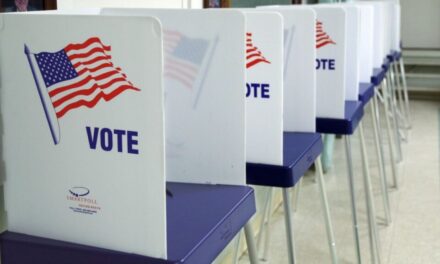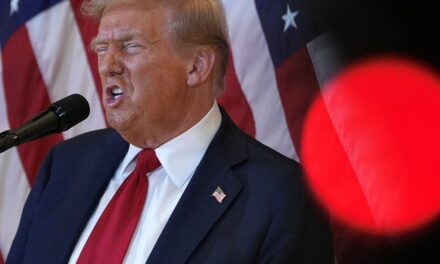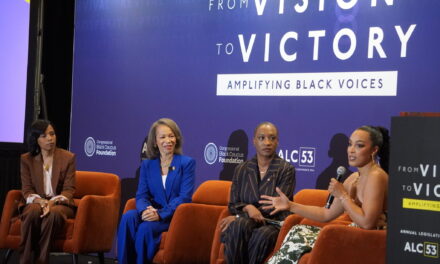
Look closely at a video of the Latvian president arriving to address Congress in 2006, and you might see a familiar face in the background.
The person wearing a bright green sweater, seated right on the aisle? That would be Rep. Lauren Underwood, then a 19-year-old intern working on the Hill.
Her boss was Barack Obama, still a senator from Illinois at the time. She hadn’t expected to be in the chamber that day to hear a foreign leader speak, but they needed interns to fill the seats — and she still remembers what it felt like to set foot on the House floor.
Now Underwood has walked it countless times as a member of Congress herself. The Illinois Democrat sat down with Roll Call last month to share some memories of her internship. This interview has been edited and condensed.
Q: What is your earliest memory of politics?
A: In first grade, they did a mock election in school. I was the only one who thought Bill Clinton was going to win, and I also was the only Black person in my class. That was my first political memory — being right that President Clinton won that election in ’92, and everybody in my class, including my teacher, was shocked.
Q: How did you get your internship with Obama?
A: In college I received a scholarship from the Jackie Robinson Foundation, and they would have these gatherings for us so that the cohort could get to know one another. One girl in the class ahead of me had just finished the Congressional Black Caucus Foundation internship the summer before. She had interned for Jesse Jackson Jr., and she came back and was like, “You should totally apply.”
I had never heard of the Congressional Black Caucus Foundation, but I applied, and I got placed with Sen. Obama, and it was awesome.
Q: What are some moments that stand out from your summer on the Hill?
A: The summer of 2006 was the last summer that Republicans were in charge. I remember it being like, stem cell week, flag burning week — and then all these people would fly in and try to get meetings and do their protests outside. I’d just never seen anything like that.
I remember they had a joint meeting of Congress where the president of Latvia at the time, [Vaira Vike-Freiberga], came to give an address. They sent interns to sit on the floor so that it would be full. And I was not what you would call properly dressed that day. I mean, it wasn’t inappropriate, but it was a loud, bright green sweater and I was seated on the aisle where the person comes in to say, “Mr. Speaker, presenting the president of Latvia.”
I was on camera the whole time, and my family got a kick out of it. We still have the C-SPAN video at home. That was just a formative moment, being able to sit on the floor of the House as an invited person to hear this world leader.
Q: What were some of your duties on a typical day?
A: We all got to staff the senator for a day, so that was very cool. And we did all the regular intern tasks. Before the Capitol Visitor Center, interns gave all the tours. But Sen. Obama was very, very popular at the time, and he was oversubscribed for interns.
So they didn’t need everybody to do the tours, and we had to do a tour test — and I failed the tour test. I was not allowed to give tours on behalf of the office. But I would do things like answer the phones, and had very challenging phone calls with people who were experiencing significant distress.
And then we were all assigned to a policy staffer. I worked with the health care staffer, Dora Hughes, who became a close friend and mentor of mine. [This was around the time Obama] was considering whether to run for president, and they were exploring many avenues to have an impact on health care.
Q: Did anything about Obama surprise you?
A: He would have us all sit around the conference room table and ask people individual questions, and then look at you and listen. And I was so taken aback and intimidated by this idea of him wanting to hear from me.
Q: Did he give you any words of wisdom?
A: The next time I spent time with him directly was the rally the week before my election in 2018, when he came to Chicago. I was [there] with my whole family, and he was like, ‘Lauren, I’m very proud of you.’
Do you remember at the end of the Obama administration, they did that big sendoff at McCormick Place and he told people to get a clipboard and they can be the change? I really took that seriously. And so many of us have gone on to lead and to continue to fight for a better America.
 Underwood, seen here outside the Capitol in 2021, is now serving her third term in the House, representing Illinois’ 14th District. (Bill Clark/CQ Roll Call)
Underwood, seen here outside the Capitol in 2021, is now serving her third term in the House, representing Illinois’ 14th District. (Bill Clark/CQ Roll Call)
Q: During the Obama administration, you worked at the Department of Health and Human Services. What was that like?
A: I was a career employee at first, [helping to implement] the Affordable Care Act. There were all these deadlines enacted into law, and it was a sprint to get everything done.
It was just a very intense time. And as you know, the Affordable Care Act was not as popular as it is today, and so I felt a lot of pressure and responsibility to not mess up. But I was so driven by this idea that we were going to help people get the health care they desperately needed.
Q: Now that you’re a member of Congress yourself, what has come full circle?
A: It’s really special to have interns in our office and ensure they have a positive experience and understand the core competencies that can shape their whole career — [like] how government works, how we interact with advocates and constituents, how to be transparent and responsive, and how essential their role is to helping us uphold that promise I made to my communities. Our office would not function without our interns, and we respect them so much.
Obviously, [being] paid is very important. The only reason I could come to D.C. was because in 2006 the Congressional Black Caucus Foundation paid us and gave us free housing with the program. I understand the significant financial pressure that young people face and how, at the end of the day, they want the experience, but they also need to be able to pay the bills.
Q: Pay for interns is one difference. What else has changed about Congress from 2006 to 2024?
A: Well, it looks different. Members are younger and more diverse, more women, more people of color. In 2006, my district was represented by Dennis Hastert. I think I embody the change that has come to Congress in that time period.



